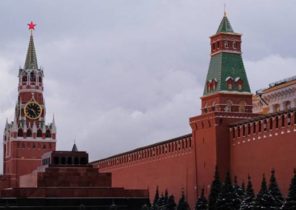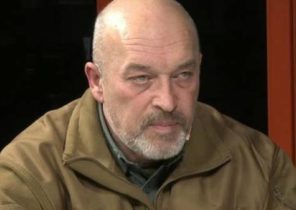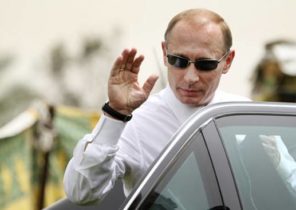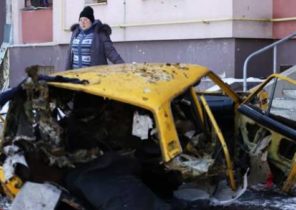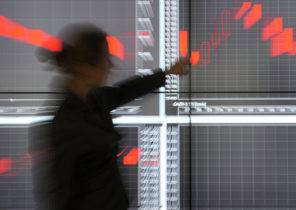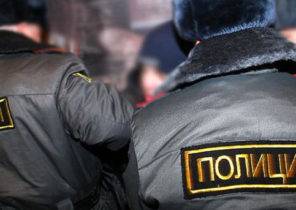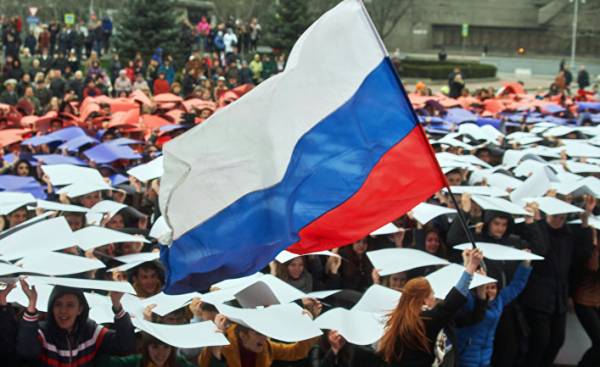
Defence.24: Your book is quite an unusual piece. It is built around the questions that you would like to ask the Russian President if he gave you an interview. How did this form?
The Striker arleta (Arleta Bojke): When we discussed with the publisher the concept of the book, I discovered my main problem: I’m a journalist-a newsman and everywhere are moving rapidly, spending a little time with my heroes, because I usually need in the day to prepare the material. It is a constant struggle with time. While working I thought about the book, it became a “by-product”. When I started to collect materials, it was found that a lot of interesting themes, but the question arose how to combine them and create a single picture. The connecting element is Vladimir Putin, because he unites all these people, with whom I met, and all these events that I watched. I wanted to interview him, but I failed, so there is a form of hypothetical questions which became the starting point for reflection on his policies from the perspective of the participants in these events, not from the perspective of important geopolitically meetings.
I wanted to present the facts so that the reader can draw their own conclusions from my experience, because such experience not everyone has, not everyone had the opportunity to travel around Russia to be in Crimea at the time of annexation or in the Donbass, when there was a war on. The book gives the opportunity to engage in a deeper analysis, because the TV footage allows you to submit a picture just simply, plainly, it lasts only three minutes and “flies” before the eyes of the viewer. And when the person reads the text, it can return to the previous paragraph again.
– Did you expect that the events in Crimea, where you come from, will end with the annexation of the Peninsula?
— I understand that events are moving in this direction, on the second day. The night before our arrival there was a message that armed men took the building of the local government and Parliament, but they had not seen. Buildings, indeed, were surrounded by police, but even from conversations without cameras showed that the police do not know why they are there. They received orders to block the approaches, but didn’t quite understand what was happening. We met other journalists and discussed with them, not speculation of it all. Everything looked very strange, but nobody at that time did not suspect that this is the beginning of annexation.
The next day, when military men in uniform without insignia appeared in the airports of Simferopol and Sevastopol, all seems to know who they are, but no one spoke it out loud. It seemed that in the Crimea there is a conspiracy of silence, though, of course, it was impossible from the point of view of logistics. In the evening on the website of the Russian TV channel I saw the pictures of “border crossings” on the roads from Crimea to continental Ukraine, and realized that the annexation of the Peninsula began. I was not sure 100%, but at that moment I first thought that the Crimea, perhaps, will no longer Ukrainian.
The next day we went to see this “border”, which was built of Russian Cossacks. They were not recognized at the time that arrived from Russia. Then they bragged about their participation in the annexation of Crimea, because this step Putin liked even to those Russians who had not at all supported his policies.
– Was there a similar plan for Eastern Ukraine?
— I think the plan there was another. In the case of the Crimea about any federalization of the question similar was, only the messages on the protection of the Russian-speaking population, but it is a permanent member of the Russian propaganda. Explaining the need for the annexation, Moscow authorities told about the historical truth, that the transfer of the Peninsula Ukraine was illegal from the point of view of international law. The operation to capture of the Peninsula was organized very cleverly: there appeared “little green men”, nobody knew who they were. When the West realized what was happening, and got the evidence the deed was done.
In the case of the Donbas from the beginning sounded the word “federalization”, which every way they inclined of the Russian policy. This, I think, was the plan for Eastern Ukraine. Perhaps he meant a wider geographical coverage, as demonstrations of opponents of the Kiev authorities were including in Dnipropetrovsk, Kharkiv, Odessa. But apparently there’s not enough money. Russia, apparently, are unable to correctly assess the strength of Pro-Russian sentiment. Society is split not quite as it looked on the map during the “orange revolution” were clearly divided into two halves. Russia certainly had a plan, and it probably included not only a part of the Lugansk and Donetsk region, but, I believe, to connect these areas no one had planned. Here you need to consider also the geographical factor: it is much easier to block the three roads that connect the Peninsula with the continent than to defend the border with a length of hundreds of kilometers.
– As with the development of the conflict has varied, the activity of the Ukrainian army?
In the East of Ukraine in the initial phase of the conflict, fought mainly by volunteers, who (often literally) fought in the winter in flip-flops against separatists backed by Russia. Then they began to be included in the ranks of the National guard and the army, that is, in formal structures. The volunteer battalions were difficult to manage, each had its own command, often they do each other hurt. Kiev took some time to reorganize their forces. In the early days of the antiterrorist operation the army were all laughing because the separatists have taken away from military tanks. When did the seizure of buildings, police remained inactive, she did not intervene and allowed the demonstrators to do whatever they want. Policemen from Donetsk, who knew many of the protesters, it was difficult to oppose her. So then there began to shift police from Western Ukraine. We met retired officers who have returned to the service because the army had problems with the command.
Time worked for the Ukrainians: they got more and more equipment, body armor, helmets and weapons. Formally, the lethal weapons they were never set, but somehow they had travelled.
Vladimir Putin, of course, was not planned, but his actions were the impetus for the formation of national consciousness of Ukrainians, which was until then rather vague. Among the soldiers who fought in the East, were those who did not support Maidan and he thought the Russian brothers, but when they saw that Russia attacked them, something in them turned over. They defended the Euromaidan or the government, and the boundaries of their own state.
– An important factor in the situation in the East of Ukraine was the position of the oligarchs. Many companies and industries owned by them were in the East, so that the conflict directly threatened their financial interests.
— The game of the oligarchs certainly played an important role, because the Eastern region was in a sense their “Autonomous principalities”. So businessmen mostly sided with Kiev. The biggest losses were suffered by the oligarchs of the “family”, that is, from the environment of Viktor Yanukovych, but it was not because of the war, and with the change of government. Now Ukrainians the impression that the oligarchs are shuffled, but nothing has changed. Ukraine is an oligarchic state, just to power approached other people.
Don’t forget that Petro Poroshenko is an oligarch too. It is difficult to imagine the President of a European state, which owns its own TV channel, and even the plant in the country with which he is waging war. Therefore, the situation remains complicated and confusing. I have many friends among the Ukrainian journalists, and they recognize that the historic event had failed, and the state not back in the hands of the people.
Very often the volunteer battalions have been something akin to private armies of the oligarchs. On the one hand, it looks dangerous, on the other, their money is benefited at the initial stage of the formation of these groups. Funds for equipment or food for people was singled out by the oligarchs, who have decided to fight for their property. Perhaps some woke up the Patriotic feelings, but entirely unselfish, their actions certainly was not.
An interesting example is the figure of Rinat Akhmetov, who eventually supported the Kiev, but at first it was played on two fronts: he advocated federalization, saying that the regions should have more power and tried to assume the role of a negotiator. On the one hand, he spoke with Arseniy Yatsenyuk, on the other — came to the Pro-Russian demonstrators who have occupied the building of Donetsk regional administration. However, he has failed to master the situation and play it the way he wanted.
Something that the Pro-Russian sentiments of the population were so strong, was, perhaps, a surprise.
— No, that East and West Ukraine — it is two different States, it was said long ago. Everyone remembered how in 2004 voted Ukrainians, two half — orange and blue. Everyone knew that the mood in Eastern Ukraine and in Crimea are very different from the mood in Kiev.
They had their reasons. These people for many years felt second-class citizens. Flared up scandals when there were records of conversations Ukrainian politicians, who called them “cockroaches”. In addition, residents of the East said that the people of Lviv have a closer relationship with the West, and they are due to geography feel an affinity to Russia, they have more economic and personal ties with her. In addition, the Donbass believed that he feeds the Ukraine, economic data although this thesis is not confirmed. All these sentiments were growing, and then they heard on Russian television that they are right.
It shows omissions of Kiev, who did not know how to Ukrainize the Eastern part of the country. From a purely political point of view, Russia was right in arguing that in 2014 there was a coup because the new government was not elected by national elections (presidential elections, and then Parliament has held only a few months after the flight of Yanukovych and Azarov). Ukrainians in the East were upset that the government has chosen without them, no one considered their opinion, even asked them. Moreover, the new government was one of the first adopted the language law that gave rise to the Russian propaganda, let more stir up emotions.
– Whether different Pro-Russian demonstrations by the age of the participants?
— It was obvious that the protesters were treated rather to a group of 40+, although this does not mean that the demonstrations were not of the youth. In the Pro-Russian actions took part the generation of their fathers and grandfathers, because they remember the Soviet era and often believe that then it was better. Russian plans partly upset that after 1991 the population was mixed, many young people from Eastern Ukraine have left, for example, in Kiev, studied in universities and was found with other views.
The book can be read that the events in the Donbas was reminiscent of the Crimean scenario, but the problem was with the command. Who were the commanders?
— There is reason to believe that most people “set fire” Donbass took part in the annexation of Crimea, the only operation on the Peninsula were much better trained and deployed in other contexts. But it is clear that the leaders of the events in the East were: someone made flags, banners breakaway republics. All this prepared in advance, because they immediately appeared in the occupied buildings of the administration. I will never believe that a couple of people rebelled, left home and staged a revolt. I believe that the leadership came from the Crimea, where the situation there has taken control. In the Donbas were Russian Cossacks, and beginning to put things in order helped the Chechen mercenaries.
– How would you describe the people who came to fight in Ukraine? In the book we see a whole gallery of characters from the FSB officers to the above mentioned Chechens and confused Russian soldiers, who were sent to fight, taking away mobile phones and passports.
— Single group was not. The part was made by local residents. At first I even had the feeling that some of them just released from prison because they specifically were. Especially in Lugansk was in the course of the phrase “who was not sitting, he is not a kid.” One of my friend the Colonel told me that from this region it was difficult to encourage people into the army, because they didn’t take those who were in prison, and in the biographies of many children from the Luhansk region this episode was.
The people who fought (and still fight) on the side of the separatists, was very different, and this is also connected the lack of a unified command center. When kidnapped OSCE monitors them for several weeks nobody could find because Donetsk separatists did not know who seized them. At the same time Pro-Russian rebels competed with each other. So when I asked a former Kremlin adviser Gleb Pavlovsky, whether Putin is a button “end of war”, he said that things are not so simple, because many people want to Express themselves, and some processes are uncontrolled. The situation does not look so that the decision-making process was transparent, and the orders were given by the General scheme. There are lots of versions, why are the “founding fathers” of the breakaway republics who’s behind it: the Ukrainian or Russian secret services, who decided that these people cannot be controlled. I think to draw some kind of pyramid hierarchy is very difficult.
– In Ukraine there was also the Chechens who fought on both sides of the front.
Yes, some of them are Kadyrov’s men. Initially, Kadyrov said that he is unable to influence them, it’s volunteers. But then in an interview with the Russian news Agency, he began to boast that he ordered them to come, and they came back. On the other side fought the Chechens who left when Kadyrov came to power, and Russia suppressed national liberation trends. It is the Chechens, with European passports, who hate those who sided with Kadyrov. Now, if Ukraine and still have the Chechens, that these are isolated phenomena, but in the first phase of the conflict, they can be found in many different places.
– How did the military actions on the level of support for the separatists among the local population?
— If to speak about support, it should be emphasized that in Crimea, the situation looked quite different than in the East of Ukraine. People who are not wanted in Russia and dared to shout it on the street, on the Peninsula was very small. Basically, you could see Tatar women who came out to protest against the Russian annexation and explained that if they were joined by men, it would be considered a provocation, would begin the bloodshed.
The first time was held in Donetsk Pro-Ukrainian demonstrations, but gradually increased fear, people began to leave. I remember when I left Donetsk by train when he was fighting for the airport from which it was impossible to fly. Trains still ran, the cars were filled with mothers with children. Fathers remained, because the Donbass was still working industrial enterprises, they stayed home and property. People who adhered to a Pro-Ukrainian views, began to leave, so the demonstration of this group is over. Some were intimidated. Now, even those who support the separatists, afraid to speak, knowing that they can do is wait.
— Can we say that the Minsk agreement has played a positive role, or will become a new Donbass Transnistria?
Now the Donbass de facto became Transnistria — non-existent state, run by gangsters. For some time maintained the status quo: exchange of fire continues, but shoot, sometimes more, sometimes less, sometimes rockets hit the residential neighborhoods, and sometimes not. Ukraine has no control over these territories. They declared independence, but no one recognized. It did not even Russia, which has recognized the documents of these republics, therefore, we can conclude that Putin was not going to Annex the Donbass. The annexation could be held, using the element of surprise when those areas were not so badly damaged. Although the situation is now such that to enter there, easier on the Russian side. To return the situation to normal is difficult because people who once received a weapon, not so easy then to pick up.
Commentators argue, holds the key to end conflict: the West or Russia.
To answer the question of who this game is very difficult. Russia is its very clever: on the one hand, she says she is not a party to the conflict, and on the other sits at the negotiating table and does not agree to the terms and conditions. The problem of the Minsk agreements is that the sequence of implementation of options not installed. Ukraine wants to first get control of the border, and Russia wants the first elections to the local authorities.
Here the West can not do anything, because someone has to concede, one of the parties will have to implement some of the points of agreement to move on to others. I omitted the fact that the withdrawal of heavy weaponry from the front line was just a facade she stays. The Minsk agreement was a dead document, but nothing better has not been invented. A plan to return the situation in the Donbass in normal reasonable, the question is how to make it a reality.
I often have the impression that both sides are in some measure interested in preserving the current state of Affairs. The Kremlin remains the lever by which he controls the intensity of the fighting and destabilizie Ukraine, although this is expensive it costs. And Kiev is an excuse to not implement reforms and does not invest heavily in the restoration of Donbass. In addition, he would have to re-integrate the local population in the region there were no saboteurs, but it is a difficult task. Even if the conflict in political terms would be settled, will be a lot of work.
— How are the basic principles of the foreign policy of Putin?
He wants the most important issues related to global devices, were solved with his participation. Therefore, development of the Syrian peace agreement (we will not discuss here its effectiveness) passed without the United States. It was a signal: we will not allow you to make decisions using our head. Russia doesn’t want America to remain the world’s policeman, so it all depended. Although their relationship has two planes: on the one hand, Moscow sees the US enemy, and on the other admires them, and the children of the Russian oligarchs often live and study in America or other Western countries, sometimes having dual citizenship.
Putin says Russia does not claim to superpower status, because, as he once said, it’s too expensive and pointless. But on the other hand, it tends to be one of the most important global players, and, of course, is now one. If he wants to re-divide spheres of influence? Possible, Yes, but not quite as it was in the Soviet era. It is, rather, about the position of Russia and its alliances, not about restoring what was in the past, because the world is moving forward. Putin himself said: “Who does not regret the collapse of the USSR, has no heart. And the one who wants to restore it in its original form, has no head”.
He understands that much water has flowed. The creation of the Eurasian Union is a continuation of great-power politics of Russia, but it continued. In addition, Putin has a lot of problems, for example, with Belarus. Lukashenko — a difficult partner, he tries to play on two fronts, but he already gave too much to break free from its leash. Putin has a lot of problems in the immediate environment, but he wants his influence stretched very far.
— Thank you for the interview.

